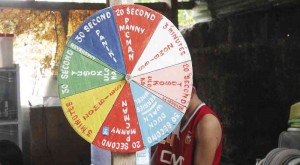
PAIN MACHINE. Detainees—mostly suspected drug traffickers—are forced to spin this wheel of torture. For example, “20 seconds Manny Pacman” means 20 seconds of nonstop punches. CONTRIBUTED PHOTO/CHR
MANILA, Philippines—Alfreda Disbarro, 32, a single mother and informant, was picked up by police in October last year in Parañaque City and accused of selling and possessing illegal drugs.
Her captors allegedly tortured her in a bid to make her confess. Her body still bears the bruises and welts she sustained.
A policeman had slammed her head against the wall six times and even stuffed her mouth with a dirty rag. At times, she would be on the receiving end of punches and blows.
Her case is just one of many allegations that Amnesty International is bringing to the fore as part of its global campaign against torture.
“One case is a case too many. Once you have succeeding incidents of torture, it will be a precedent for future abuses,” said Wilmer Papa, campaign coordinator of Amnesty International Philippines.
In a press conference, the international rights group with the Commission on Human Rights (CHR) and the United against Torture Coalition launched its version of a global campaign against torture.
Disbarro’s case is one of three cases presented on Tuesday, the other two being the secret detention center in Laguna discovered early this year and the torture incident in Manila caught on video in 2010.
Amnesty pointed out that despite the 2009 Anti-Torture Act, the abuses continue, perpetrated usually by the police and the military.
“It is not enough that the perpetrators are relieved from their duties, they should be investigated, prosecuted and made accountable,” said Hazel Galang-Folli, the group’s researcher for Southeast Asia.—Julie M. Aurelio